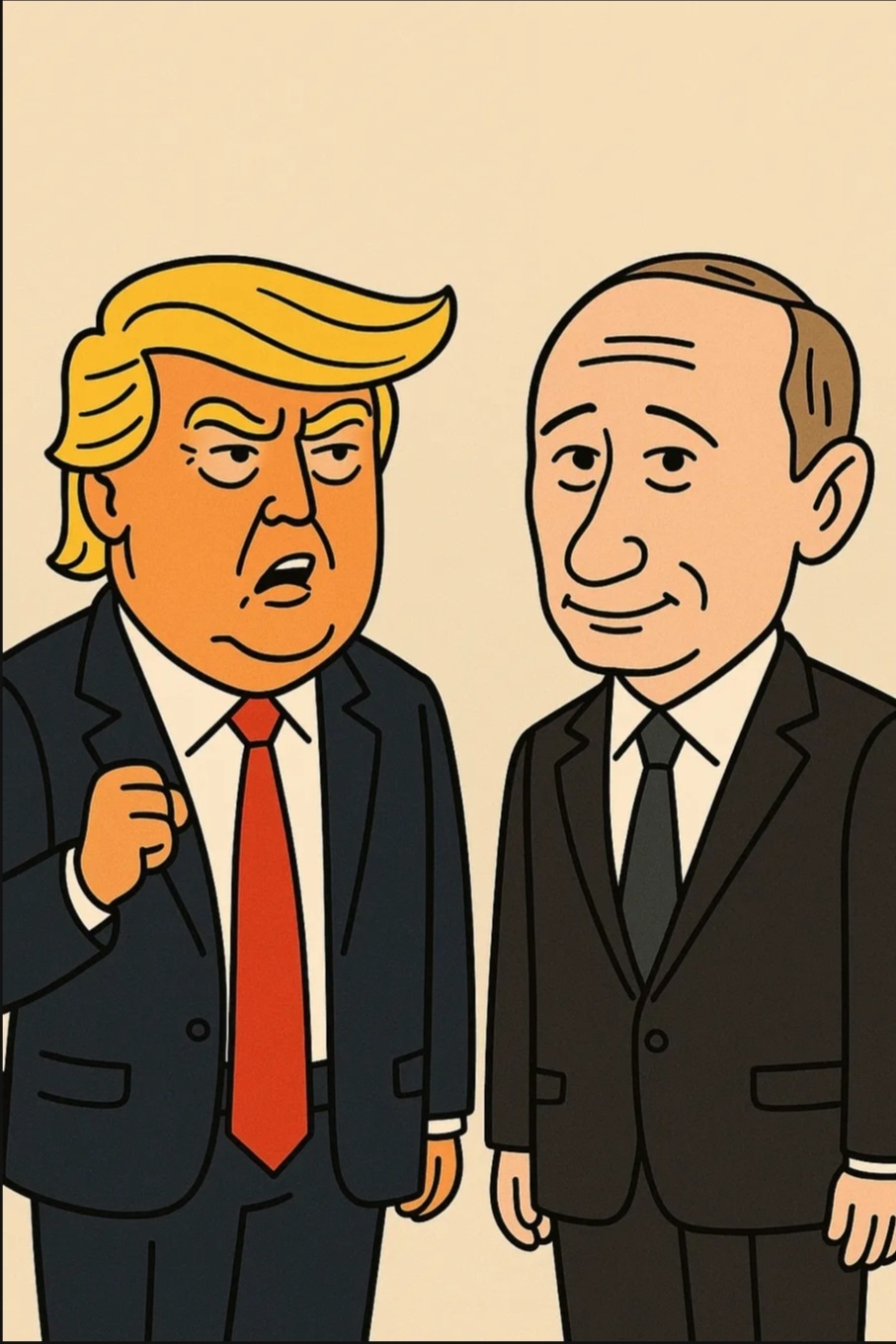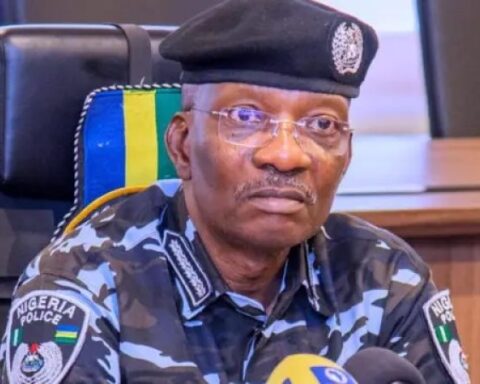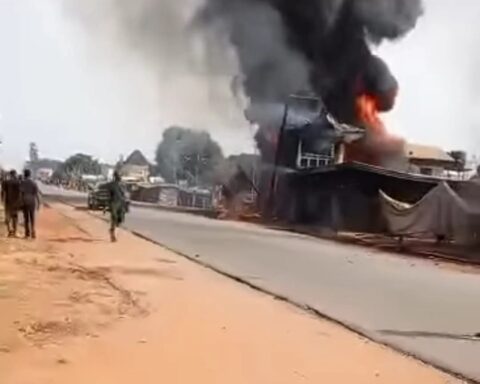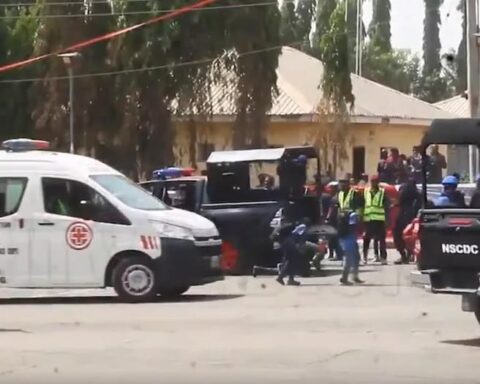By Agbeze Ireke Kalu Onuma
The hottest places in hell are reserved for those who, in times of moral crisis, maintain their neutrality,” Dante Alighieri’s timeless admonition echoes through the centuries with terrifying prescience as we confront the grotesque spectacle of the Anchorage summit, where the leader of the free world offered not condemnation but conviviality to a man whose forces have systematically murdered tens of thousands of Ukrainians, reduced cities to radioactive rubble, and engineered Europe’s largest humanitarian crisis since the Second World War.
This was not diplomacy but a meticulously choreographed farce – a macabre pantomime of power staged on the frozen tundra of Alaska, land once purchased from Russia in a transaction that now seems a haunting precursor to this week’s discussion of territorial concessions, with Trump’s team even misplacing sensitive State Department documents at an Anchorage hotel in what critics are calling a metaphor for the administration’s careless approach to national security . The military flyovers and red carpets – that blood-red carpet – unrolled for Vladimir Putin on American soil symbolized not just a shocking moral abdication but a profound historical irony: that this meeting, billed as a pursuit of peace, occurred on territory that Russian nationalists still covet, a point Putin himself underscored by pointedly referring to Trump as “neighbor” upon arrival, a deliberately provocative nod to revanchist dreams that extend far beyond Ukraine.
What transpired in those three hours behind closed doors was less a negotiation than a surrender of Western leverage, a unilateral disarmament of diplomatic pressure that saw Trump lauding his “fantastic relationship” with a war criminal while conceding – with the bland vagueness of a reality show host – that “there’s no deal until there’s a deal,” a statement so devoid of substance that it provoked former U.S. Ambassador to Russia John Sullivan to dismiss the entire summit as a “nothingburger” devoid of any concrete achievements, let alone the ceasefire Trump had promised . The choreography alone spoke volumes: Putin, who arrived under ICC indictment for war crimes, was granted the prestige of a full-state welcome, including a shared ride in the presidential limousine where he was seen laughing triumphantly, while the press conference that followed saw Trump yielding the first word to the Russian leader – a subtle but devastating symbolic concession that echoed Kennedy’s unpreparedness in Vienna 1964, which emboldened Khrushchev to escalate into the Berlin Wall crisis.
Putin’s remarks were a masterclass in cynical realpolitik, praising the “constructive atmosphere” and floating vague “security guarantees” while refusing to detail any concrete commitments, alluding to unspecified “agreements” that would supposedly pave the path to peace but which, in reality, served as a smokescreen for his central demand: that Ukraine capitulate to territorial dismemberment and permanent neutralization, effectively legitimizing his conquest and rewarding his brutality.
The silence on atrocities was deafening – a moral vacuum that screamed complicity. At no point did Trump publicly denounce the Bucha massacres, the Mariupol theater bombing, or the filtration camps where thousands have vanished into Putin’s gulag system, nor did he secure a single commitment toward a ceasefire, instead telling Fox News’ Sean Hannity afterward that “we don’t have to think about” severe consequences for Russia, despite having threatened them just days prior, a reversal that effectively greenlit continued Russian aggression and left Ukrainian civilians to bear the brunt of renewed offensives.
This omission was not oversight but strategy: a calculated evasion designed to preserve Putin’s comfort, and it sent an unmistakable message to the world that American leadership now views genocide as a negotiable sidebar rather than a red line, a betrayal that Hungarian autocrat Viktor Orbán predictably praised as making “the world a safer place” while Czech Foreign Minister Jan Lipavský blasted Putin’s “propagandistic nonsense” and reminded us that “the problem is Russian imperialism, not Ukraine’s desire to live freely” . The summit’s substance – or lack thereof – laid bare a chilling reality: while Putin reiterated demands for Ukrainian “demilitarization” and NATO exclusion (tantamount to surrender), Trump offered only vague claims of “great progress,” no joint statement was issued, no framework for negotiations established, and crucially, no ceasefire secured, even as Russian missiles struck Kharkiv during the handshakes.
Global reactions ranged from scathing condemnation to troubled acquiescence, with European leaders uniformly rejecting Putin’s “root causes” rhetoric – a transparent smokescreen for imperialism – while NATO reaffirmed Ukraine’s “irreversible path” to membership in defiance of Russian demands . Ukrainian officials, though diplomatic in public, privately expressed despair, with lawmaker Oleksiy Honcharenko noting that “Putin has bought himself more time” as Zelenskyy rushed to Washington for a emergency meeting to reclaim agency in a process that had sidelined him, a humiliating spectacle that reduced a sovereign nation to a pawn in great power games . Estonian MP Marko Mihkelson captured the sentiment of frontline states, writing that the meeting “was no surprise. Putin wanted to humiliate the US – and he succeeded,” while Lithuania’s defense minister Dovile Sakaliene dismissed Putin’s comments about European obstruction as “gaslighting and veiled threats” noting that Russian forces had bombed civilians even during the summit itself. Even Hillary Clinton’s backhanded offer to nominate Trump for a Nobel Prize if he ended the war without ceding territory – a seemingly magnanimous gesture – reeked of political theater, implicitly acknowledging the near-impossibility of such an outcome given the administration’s palpable eagerness for a deal at any cost.
Historical context only deepens the sense of tragic farce. Contrast Anchorage with summits that actually transformed the world: Yalta in 1945, where Roosevelt and Stalin forged a post-war order despite profound ideological divides; Reykjavík in 1986, where Reagan and Gorbachev nearly agreed to eliminate nuclear arsenals, paving the way for the INF Treaty; or even the fraught but functional diplomacy of the Cold War detente era, which produced tangible arms control agreements like SALT I and the ABM Treaty . These meetings succeeded because they were anchored in principles rather than pageantry, specificity rather than vagueness, and a clear-eyed understanding that diplomacy without leverage is merely supplication.
Anchorage, as already mentioned above, by contrast, echoed the failed 1961 Vienna Summit, where Kennedy’s unpreparedness emboldened Khrushchev to escalate into the Berlin Wall crisis, or the 1938 Munich Conference, where Chamberlain’s pursuit of “peace for our time” through concessions to Hitler only guaranteed a wider war . Trump’s transactional approach – rooted in reality-show theatrics rather than strategic clarity – ignored the hard lessons of history: that autocrats interpret concession as weakness, and that moral equivocation empowers monsters, a point underscored by the chorus of condemnation from across the political spectrum, from Senator Jeanne Shaheen’s denunciation of Trump for rolling out “a red carpet and warmly greet[ing] a murderous dictator on American soil” to EU foreign policy chief Kaja Kallas’ warning that Moscow “won’t end the war until it realizes it can’t continue” .
The Anchorage summit stripped away the final veneer of deniability, revealing Donald Trump not merely as a useful idiot or a compromised asset, but as the quintessential Manchurian candidate – a puppet whose strings are pulled so blatantly that the puppeteer’s shadow looms over every concession, every silence, every betrayal. For decades, intelligence operatives from Moscow to Warsaw have whispered about “Krasnov,” the code name allegedly assigned to Trump during his 1987 KGB recruitment, a fact once dismissed as conspiracy theory but now hauntingly validated by a parade of former Soviet agents like Yuri Shvets and Alnur Mussayev, who describe a systematic cultivation leveraging Trump’s “vulnerability intellectually, and psychologically, and he was prone to flattery” .
The evidence is no longer circumstantial: it is operational. Trump’s refusal to release his tax returns, his family’s financial entanglements with Russian oligarchs, his repeated disclosure of classified intelligence to Russian officials in the Oval Office – as witnessed in 2017 when he handed over ISIS intelligence sourced from Israeli operations – all form a pattern of allegiance that transcends mere political alignment . His sabotage of NATO, his paralysis on Ukrainian aid, his adoption of Kremlin talking points verbatim – from labeling Ukraine a “Nazi state” to questioning its sovereignty – are not diplomatic missteps but executions of a script written in Moscow.
The Anchorage performance was the culmination of this decades-long project: a public demonstration that the American presidency is now a subsidiary of the Kremlin, where Putin dictates terms while Trump nods in obedient silence, his earlier threats of “severe consequences” evaporating like Arctic mist . Even the choreography betrayed the hierarchy – Putin speaking first on U.S. soil, Trump’s deferential body language, the absence of U.S. interpreters in private sessions – all mirroring the dynamics of a handler greeting his asset . Historian Timothy Snyder’s warning that “post-truth is pre-fascism” finds its apotheosis here: a leader so thoroughly co-opted that he no longer bothers to conceal his loyalties, confident that his base will cheer the surrender of American primacy as “strength”.
Beneath the spectacle lies the engine of control: a fusion of financial dependency, sexual kompromat, and ideological sympathy that binds Trump to Putin’s agenda. The Steele Dossier’s infamous “golden showers” tape may never surface, but its psychological truth is undeniable – Trump’s vulnerability to blackmail, meticulously documented by KGB operatives during his 1987 trips to Moscow’s nightclubs and luxury suites, where they engineered compromising scenarios designed to ensure lifelong compliance . More damning than sexual kompromat, however, is the financial pipeline that has buoyed Trump’s empire for decades. From the 200 television sets purchased from KGB-front Joy-Lud electronics in 1980 to the $50 million infusion from Russian-linked entities into Trump Tower during the 2008 financial crisis, Moscow has functioned as his shadow creditor.
This dependency deepened through his presidency, with his son Eric admitting in a leaked email that “all our funding is from Russia,” while his tax returns show mysterious millions flowing through Cypriot shell companies linked to oligarchs . But the ultimate glue is ideological: Trump’s autocratic yearnings mirror Putin’s, his disdain for democracy, his persecution of minorities, his worship of strength – all reflecting what ex-KGB officer Sergei Zhyrnov calls “the synchronization of ambitions” . This is not mere affinity; it is fusion. When Trump revealed classified NATO contingency plans to Russian diplomats in 2017, or when he ordered the withdrawal of U.S. cyber-ops targeting GRU units in 2024, he was not bumbling – he was delivering on his end of a bargain . The Anchorage farce was merely the invoice coming due: a public display of fealty proving that the Manchurian candidate is no longer a hypothetical nightmare but the operating reality of the American presidency.
The path forward demands a radical recalibration of Western strategy – one that centers Ukrainian agency, imposes immediate costs on Russia, and rejects the false dichotomy between peace and principle. First, the U.S. and allies must freeze Russian sovereign assets fully and lower oil price caps to 47/barrel, leveraging the EU’s 50 billion 2024 aid pledge to ensure Kyiv has the weapons to fight while cutting off the Kremlin’s war financing . Second, any peace process must include Ukraine before ceasefires – not after, as the EU insists, “No negotiations on Ukraine without Ukraine,” a principle Trump blatantly violated by sidelining Zelenskyy and then telling him to “make a deal” as if negotiating a hotel contract rather than a nation’s survival. Third, we must recognize that Putin’s invocation of Alaska’s history – and his smirk as he invited Trump to Moscow for the next round of talks – was not casual trivia but a deliberate signal of expansionist intent, a reminder that his ambitions extend beyond Ukraine to the revision of the entire post-Cold War order, a point underscored by his regime’s relentless propaganda framing the war as a clash with “satanic” Western hegemony.
In the end, Anchorage will be remembered not for what it achieved but for what it revealed: the collapse of American moral authority in the face of unvarnished tyranny. When Trump applauded Putin on that crimson carpet, he did not merely host an autocrat – he normalized barbarism, offering a spectacle of impunity that will embolden aggressors from Beijing to Tehran for years to come. The summit’s legacy is a warning that in the face of genocide, there is no middle ground between resistance and complicity, and that diplomacy divorced from principle is merely deflection dressed in pomp. As Dante reminds us, hell reserves special torment for those who stand neutral in moments of moral crisis – a fate this administration now risks not for itself alone, but for all of us who depend on the fragile edifice of democratic order. What follows this farce is not a blueprint for peace, but a reckoning: either the United States reclaims its conscience, or it accepts its irrelevance on a world stage where might once again makes right, and where the strong devour the weak while the world looks on and shrugs.



























